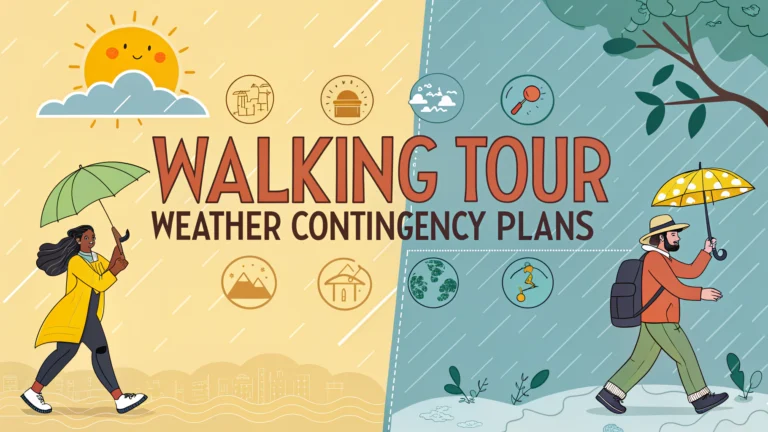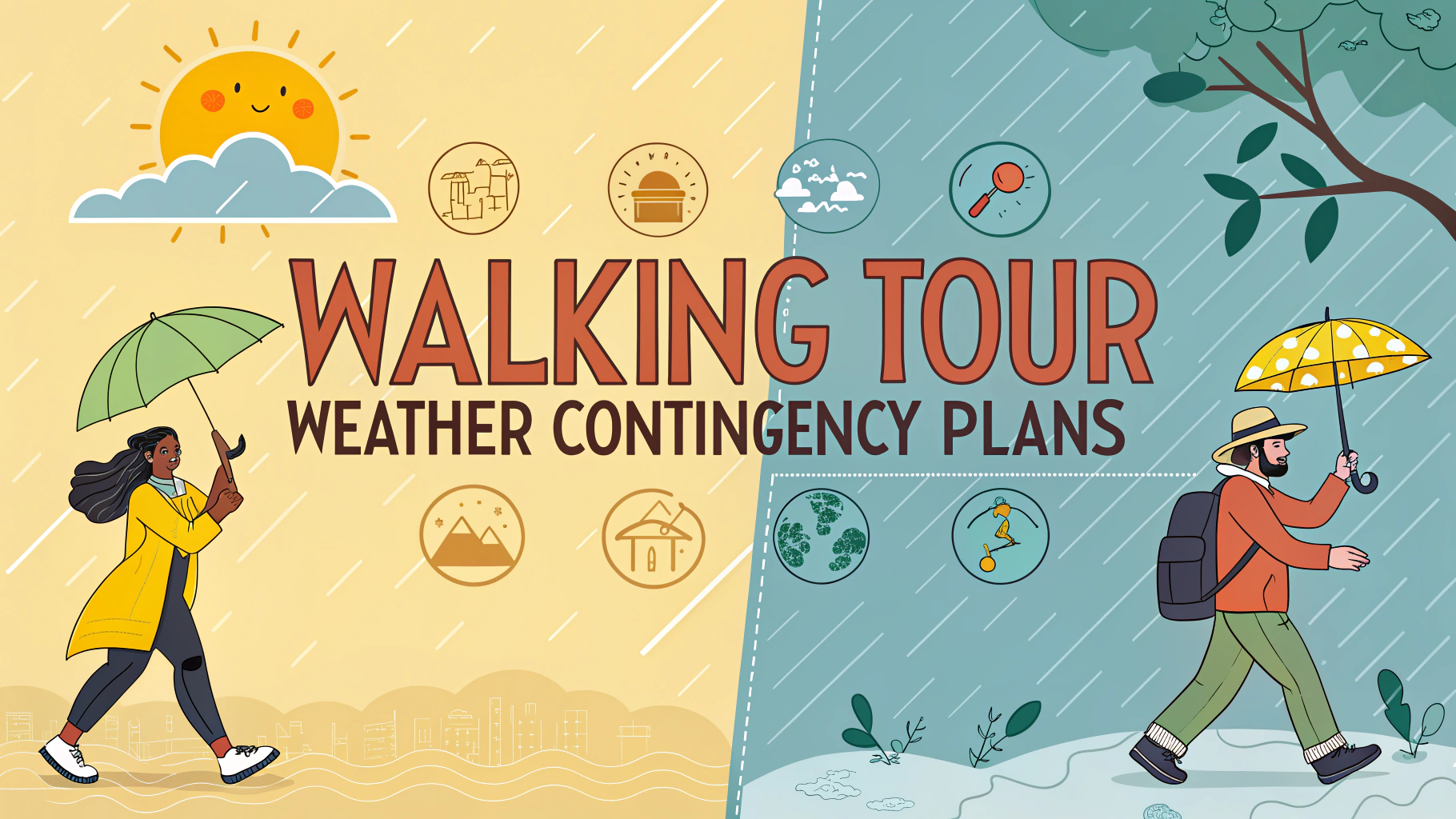Weather can make or break a walking tour experience, so having solid backup plans is essential for both tour operators and self-guided explorers.
Quick Indoor Alternatives
- Museums near popular walking routes
- Historic buildings and churches along the path
- Local cafes and shops for temporary shelter
- Indoor markets and galleries
Weather Monitoring Tools
Download reliable weather apps like AccuWeather or Dark Sky for precise hour-by-hour forecasts.
Set up weather alerts on your phone for sudden changes during your tour.
Essential Gear for Weather Changes
- Rain Protection: Compact umbrella, lightweight rain jacket
- Temperature Control: Layered clothing, removable sweater
- Sun Protection: Hat, sunscreen, sunglasses
- Footwear: Waterproof walking shoes
Flexible Route Planning
Map out shorter segments that can be completed between weather changes.
| Weather Condition | Recommended Action |
|---|---|
| Light Rain | Continue with rain gear |
| Heavy Rain | Pause at indoor location |
| Extreme Heat | Adjust timing to early morning |
| Strong Winds | Choose sheltered routes |
Time Management Tips
- Start tours earlier in the day when weather is typically more stable
- Plan indoor breaks every 30-45 minutes
- Schedule flexible days in your itinerary for weather-related adjustments
Safety Considerations
Keep emergency numbers saved in your phone, including local taxi services for quick transportation if needed.
Check official weather service websites (weather.gov in the US) before starting your tour.
Digital Backup
- Download offline maps
- Save tour content on your device
- Keep portable charger for extended indoor waiting periods
Group Management
For self-guided group tours, establish a clear communication plan and meeting points along the route.
Share your contingency plans with all group members before starting the tour.
Refund and Rescheduling Policies
If using a tour service, understand their weather-related policies and booking flexibility options before purchasing.
Many tour operators offer rain checks or indoor alternatives during severe weather.
Local Resources
Save contact information for nearby attractions that can serve as backup activities.
Research indoor walking routes through connected buildings or underground passages where available.
Communication Strategies
Create a group chat or use messaging apps to keep all participants updated on weather changes and plan modifications.
Essential Contact Information
- Tour guide or operator’s direct line
- Local weather advisory hotline
- Backup venue phone numbers
- Transportation services
Seasonal Considerations
Different seasons require specific preparation and alternative planning strategies.
| Season | Key Preparations |
|---|---|
| Summer | Water stations, cooling breaks, UV protection |
| Winter | Heated rest stops, shortened routes, ice safety |
| Spring | Waterproof gear, allergy medications, flexible timing |
| Fall | Layer options, wind protection, earlier start times |
Documentation and Feedback
- Keep records of successful weather adaptations
- Document alternative routes that worked well
- Collect participant feedback on weather solutions
Conclusion
Success in walking tours depends heavily on weather preparedness and flexible planning. Having robust backup plans, appropriate gear, and clear communication channels ensures enjoyable experiences regardless of weather conditions. Regular updates to weather contingency plans based on seasonal patterns and participant feedback will continue to improve tour resilience and participant satisfaction.
Remember that safety should always be the primary concern, and it’s better to modify or postpone a tour than risk participant wellbeing during severe weather conditions.
FAQs
- What should I do if it starts raining during my self-guided walking tour?
Pack a lightweight, foldable rain jacket or umbrella, seek temporary shelter in nearby cafes or museums, and consider switching to indoor attractions along your route until weather improves. - How can I modify my walking tour route for extreme heat?
Plan walks during early morning or evening hours, stick to shaded streets and paths, bring plenty of water, and incorporate indoor rest stops like museums or shops into your itinerary. - What backup plans should I have for severe weather conditions?
Research nearby indoor alternatives like museums, galleries, or shopping centers along your route, download ride-sharing apps, and save local public transportation routes for quick pivots. - Should I book a self-guided walking tour if the forecast shows thunderstorms?
Consider rescheduling for safety if thunderstorms are likely. If committed to the date, prepare an indoor alternative itinerary focusing on museums and indoor attractions in the same area. - What essential weather-related items should I pack for a walking tour?
Carry a small umbrella, layered clothing, sun protection (hat, sunscreen, sunglasses), water bottle, and weather-appropriate footwear. - How can I check real-time weather updates during my walking tour?
Download reliable weather apps with radar capabilities, enable weather alerts on your phone, and bookmark local weather service websites for your tour location. - What’s the best way to protect my tour materials from rain?
Use waterproof map holders or laminated materials, store digital guides on your phone, and keep paper materials in resealable waterproof bags. - How early should I check the weather forecast before my walking tour?
Check long-range forecasts 1 week ahead for planning, then 24 hours before, and again the morning of your tour for the most accurate prediction. - What temperature ranges are ideal for self-guided walking tours?
Most comfortable conditions are between 60-75°F (15-24°C) with low humidity. Tours are generally manageable between 45-85°F (7-29°C) with proper preparation. - Is it worth getting travel insurance for weather-related cancellations of walking tours?
For self-guided tours involving prepaid elements like audio guides or entry tickets, basic travel insurance can protect against weather-related cancellations and allow for flexible rescheduling.








